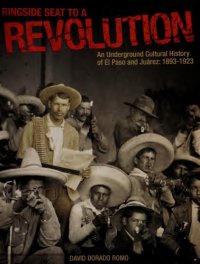
Ebook: Ringside Seat to a Revolution: An Underground Cultural History of El Paso and Juárez: 1893-1923
Author: David Dorado Romo
- Year: 2005
- Publisher: Cinco Puntos Press
- City: El Paso, Texas
- Language: English
- pdf
El Paso/Juárez served as the tinderbox of the Mexican Revolution and the tumultuous years to follow. In essays and 240 archival photographs, David Romo tells the surreal stories at the roots of the greatest Latin American revolution: The sainted beauty queen Teresita inspires revolutionary fervor and is rumored to have blessed the first rifles of the revolutionaries; anarchists publish newspapers and hatch plots against the hated Porfirio Diaz regime; Mexican outlaw Pancho Villa eats ice cream cones and rides his Indian motorcycle happily through downtown; El Paso’s gringo mayor wears silk underwear because he is afraid of Mexican lice; John Reed contributes a never-before-published essay; young Mexican maids refuse to be deloused so they shut down the border and back down Pershing’s men in the process; vegetarian and spiritualist Francisco Madero institutes the Mexican revolutionary junta in El Paso before crossing into Juárez to his ill-fated presidency and assassination; and bands play Verdi while firing squads go about their deadly business. Romo’s work does what Mike Davis’ City of Quartz did for Los Angeles—it presents a subversive and contrary vision of the sister cities during this crucial time for both countries.
David Dorado Romo—a micro-historian, a man with his feet on both sides of the Rio Grande—gives us new eyes and a re-imagined perspective to witness these revolutionary years. Through detailed research, archival photographs and great storytelling, he relates the history of a long-ignored cultural and political renaissance that was born of the conflict to depose the Díaz Regime and the bloody struggles that followed. His history helps us define fronterizos, a hybrid group of people—not wholly Mexican, not wholly American—who played an essential role in launching the Mexican Revolution.
This marvelous cast of characters includes well known characters like the people’s revolutionary, Pancho Villa, who rides his Indian motorcycle through the streets of El Paso and Teresa Urrea, la Santa de Cabora, who was the spiritual inspiration for so many of the paisanos who gave their lives for Mexico.
But Ringside Seat is also about insurrection from the perspective of the peripheral characters: military band musicians who played Verdi operas during executions in Juárez; filmmakers who came to the border to make silent movies like The Greaser’s Revenge and Guns and Greasers; female bullfighters; poets; jazz musicians; Anglo pool hustlers reborn as postcard salesmen; Chinese illegal aliens; arms smugglers; and, of course, revolutionaries, counterrevolutionaries and counter-counterrevolutionaries.
David Dorado Romo—a micro-historian, a man with his feet on both sides of the Rio Grande—gives us new eyes and a re-imagined perspective to witness these revolutionary years. Through detailed research, archival photographs and great storytelling, he relates the history of a long-ignored cultural and political renaissance that was born of the conflict to depose the Díaz Regime and the bloody struggles that followed. His history helps us define fronterizos, a hybrid group of people—not wholly Mexican, not wholly American—who played an essential role in launching the Mexican Revolution.
This marvelous cast of characters includes well known characters like the people’s revolutionary, Pancho Villa, who rides his Indian motorcycle through the streets of El Paso and Teresa Urrea, la Santa de Cabora, who was the spiritual inspiration for so many of the paisanos who gave their lives for Mexico.
But Ringside Seat is also about insurrection from the perspective of the peripheral characters: military band musicians who played Verdi operas during executions in Juárez; filmmakers who came to the border to make silent movies like The Greaser’s Revenge and Guns and Greasers; female bullfighters; poets; jazz musicians; Anglo pool hustlers reborn as postcard salesmen; Chinese illegal aliens; arms smugglers; and, of course, revolutionaries, counterrevolutionaries and counter-counterrevolutionaries.
Download the book Ringside Seat to a Revolution: An Underground Cultural History of El Paso and Juárez: 1893-1923 for free or read online
Continue reading on any device:

Last viewed books
Related books
{related-news}
Comments (0)